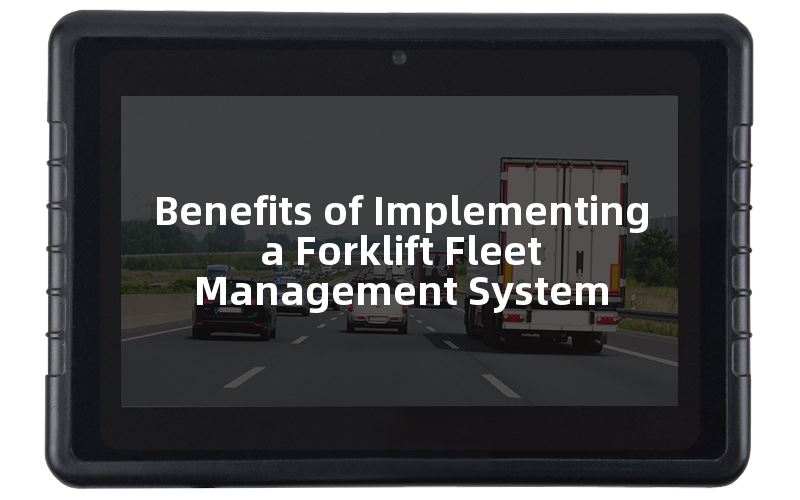In today’s fast-paced industrial environments, managing a fleet of forklifts efficiently is crucial for maintaining productivity and safety. A comprehensive Forklift Fleet Management System (FFMS) provides the tools and insights necessary to optimize the usage, maintenance, and overall performance of your forklift fleet. This article delves into the essential features and benefits of an FFMS, highlighting how it can transform your operations.

What is a Forklift Fleet Management System?
A Forklift Fleet Management System is an integrated solution designed to oversee and streamline all aspects of forklift operations. It encompasses a range of functionalities, including real-time tracking, maintenance scheduling, operator management, and performance analytics. By leveraging advanced technologies such as IoT, telematics, and data analytics, an FFMS provides a holistic view of your fleet, enabling informed decision-making and proactive management.

Key Features of an Effective Forklift Fleet Management System
Real-Time Tracking and Monitoring
One of the most critical features of an FFMS is real-time tracking. By using GPS and telematics, the system provides live updates on the location and status of each forklift. This allows managers to monitor usage patterns, detect unauthorized movements, and ensure that forklifts are being used efficiently.
Maintenance Management
Proper maintenance is essential for the longevity and reliability of your forklift fleet. An FFMS schedules routine maintenance tasks, tracks service history, and alerts you to upcoming maintenance needs. This proactive approach helps prevent unexpected breakdowns, reduces downtime, and extends the lifespan of your equipment.
Operator Management
Managing forklift operators effectively is vital for both safety and productivity. An FFMS includes features for tracking operator certifications, monitoring performance, and enforcing safety protocols. By analyzing operator behavior, the system can identify areas for improvement and provide targeted training to enhance skills and reduce accidents.
Performance Analytics
Data-driven insights are at the heart of a robust FFMS. The system collects and analyzes data on various performance metrics, such as fuel consumption, utilization rates, and idle times. These insights enable managers to identify inefficiencies, optimize resource allocation, and make data-backed decisions to improve overall fleet performance.

Benefits of Implementing a Forklift Fleet Management System
Enhanced Safety
Safety is a paramount concern in any industrial setting. An FFMS enhances safety by ensuring that forklifts are operated by certified personnel, maintained regularly, and monitored for compliance with safety standards. Features like impact detection and geo-fencing add additional layers of protection, preventing accidents and reducing the risk of injuries.
Increased Productivity
By optimizing forklift usage and minimizing downtime, an FFMS significantly boosts productivity. Real-time tracking and efficient maintenance scheduling ensure that forklifts are available when needed and operating at peak performance. This results in faster turnaround times, improved workflow, and higher operational efficiency.
Cost Savings
An FFMS contributes to cost savings in several ways. By reducing the frequency of breakdowns and extending the lifespan of your equipment, it lowers maintenance and replacement costs. Additionally, optimized fuel consumption and reduced idle times translate to lower operational expenses. The system’s analytics capabilities also help identify cost-saving opportunities and streamline resource allocation.
Compliance and Reporting
Regulatory compliance is a critical aspect of fleet management. An FFMS simplifies compliance by maintaining accurate records of maintenance, inspections, and operator certifications. The system can generate detailed reports for audits and regulatory reviews, ensuring that your operations meet industry standards and legal requirements.

Choosing the Right Forklift Fleet Management System
When selecting an FFMS, it is essential to consider the specific needs of your operation. Look for a system that offers comprehensive features, scalability, and ease of integration with your existing infrastructure. User-friendly interfaces, robust support, and customizable options are also crucial factors to ensure a smooth implementation and long-term success.
Conclusion
A Forklift Fleet Management System is an indispensable tool for modern industrial operations. By providing real-time tracking, proactive maintenance management, operator oversight, and performance analytics, it empowers businesses to enhance safety, boost productivity, and achieve significant cost savings. Investing in a robust FFMS is a strategic decision that will drive operational excellence and ensure the long-term success of your forklift fleet.
Latest Content
Tags: FFMS, Fleet Management, Fleet Vehicle Management, Forklift Fleet Management Software, Forklift Fleet Management System, what is fleet management








